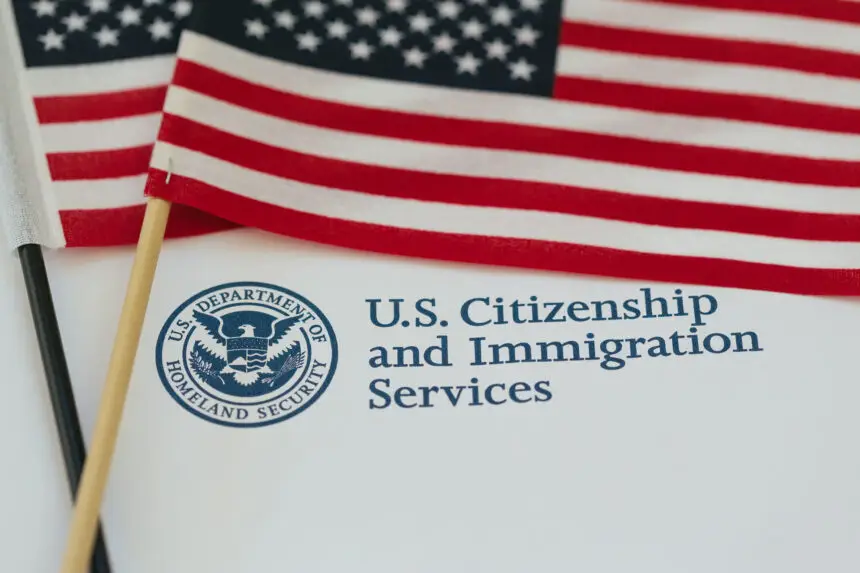U.S. Citizenship and Immigration Services (USCIS) has been granted sweeping new law enforcement authorities under a final rule published this week, expanding the agency’s role far beyond its traditional focus on processing immigration benefits.
The rule authorizes USCIS to operate with powers that mirror those of federal law enforcement agencies. Officers newly designated as USCIS 1811 special agents will now be able to carry firearms, make arrests, and execute search and arrest warrants. They will also be able to investigate and present cases for prosecution when they believe America’s immigration laws have been violated.
In announcing the change, USCIS framed the expansion as a matter of integrity and security. “USCIS has always been an enforcement agency. By upholding the integrity of our immigration system, we enforce the laws of this nation,” said USCIS Director Joseph B. Edlow. He added that the new rule, made possible by Homeland Security Secretary Kristi Noem’s delegation of authority, represents a “historic moment” for the agency.
According to Edlow, the expanded authority will allow USCIS to better address immigration crimes and strengthen cooperation with other agencies. “This historic moment will better address immigration crimes, hold those that perpetrate immigration fraud accountable, and act as a force multiplier for DHS and our federal law enforcement partners, including the Joint Terrorism Task Force,” he said.
A Shift in Mission
For years, USCIS has been known primarily as the agency that processes applications for visas, green cards, naturalization, and asylum. While enforcement functions existed within its Fraud Detection and National Security Directorate, the heavy lifting on investigations and arrests was generally carried out by U.S. Immigration and Customs Enforcement (ICE).
The final rule changes that balance. It allows USCIS to handle investigations from start to finish, rather than referring cases to ICE’s Homeland Security Investigations (HSI). Officials say the shift will free ICE to focus more heavily on disrupting transnational crime and removing undocumented immigrants.
“USCIS will be able to more efficiently clear its backlogs of aliens who seek to exploit our immigration system through fraud, prosecute them, and remove them from the country,” the agency explained in its statement.
The delegation also grants USCIS authority to order expedited removals in certain cases. This means that an agency once viewed primarily as a service provider for immigrants now has the ability to both adjudicate and enforce, blurring the lines between administrative functions and law enforcement.
Concerns About Oversight
Immigration advocates and legal scholars say the rule raises serious questions about oversight, accountability, and the impact on immigrant communities. For them, placing arrest and prosecution powers in the hands of the same agency responsible for processing applications could undermine trust in the system.
“Applicants may be less willing to come forward if they fear the agency deciding their case also has the authority to arrest them,” said one immigration attorney who has worked with asylum seekers for over two decades.
Critics worry that the shift could lead to what some call a “dual-role problem.” USCIS officers reviewing applications for benefits will now also be part of an agency with the power to investigate and arrest. Civil liberties advocates argue that this dual role creates conflicts of interest and weakens procedural safeguards.
Expanded Power, Uncertain Impact
The USCIS rule comes at a moment when immigration enforcement is already a divisive subject. While the agency insists the focus is on combating fraud and protecting national security, the breadth of the new powers has left many unsettled.
Through this delegation, USCIS special agents will be empowered to investigate both civil and criminal violations of immigration law. The ability to order expedited removal adds to their reach, making it easier to fast-track deportations. Supporters of the rule argue that this strengthens the government’s capacity to protect the integrity of the system.

Recruitment and Training Ahead
The agency plans to begin recruiting and training a corps of special agents to exercise the new authorities. Details are outlined in the final rule, published in the Federal Register. The rule is scheduled to take effect 30 days after publication.
For immigrants, the practical implications remain uncertain. On one hand, the rule may allow USCIS to move more quickly against fraudulent actors who exploit the system. On the other, it may also bring new risks for lawful permanent residents, visa holders, and applicants who interact with the agency in good faith.
Director Edlow, however, defended the move as necessary for national security and public trust. “As Secretary Noem delegated lawful authorities to expand the agency’s law enforcement capabilities, this rule allows us to fulfill our critical mission,” he said.
A Broader Debate
The new rule highlights a broader debate about the future of U.S. immigration enforcement. Should the agency that processes benefits also wield broad law enforcement authority? For now, the administration is betting that a stronger USCIS will serve as a “force multiplier” for national security and public safety.
Yet, as the changes take effect, immigrants and their advocates are bracing for a more complex and possibly more intimidating relationship with an agency that once called itself the “service” side of immigration.
With the rule now in place, USCIS is set to enter a new phase—one that could reshape the balance between service and enforcement in America’s immigration system for years to come.







